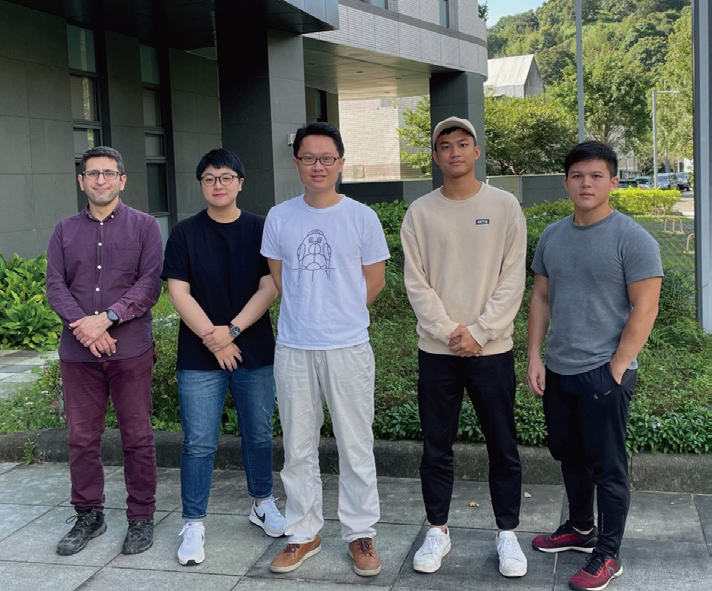Neural Processing of Social Information in Virtual Reality
In modern times, social interaction occurs frequently in virtual environments (VRs) such as social media and multi-player online video games. In VRs, classical social cues such as facial expressions, hand gestures and body contact are often absent. We are interested in identifying sensory cues that are critical for a prolonged involvement in VRs. The focus of the lab will be studying how the brain processes social information during interaction with virtual conspecifics. This research can have a direct impact on issues such as video game and internet addiction.
Using visual VRs, we will construct virtual animals to interact with the real animal. Since the behavior of virtual animals can be precisely controlled, we can analyze how factors such as response delay or response predictability will affect the intensity and the duration of social interaction.
We use adult zebrafish as a vertebrate animal model to study brain functions during behaviors. Adult zebrafish has a rich repertoire of learning and social behaviors while the brain is small enough for largescale analyses of neuronal activity using optical methods. We will focus our analyses on the interaction between brain regions that are proposed to be involved in controlling emotion, memory and decision making.
One of our working hypotheses is that prediction plays a critical role in social interaction. We aim to identify neuronal populations that encode prediction signals and prediction error signals during social interaction. We will also analyze these neural signals in zebrafish with mutations in autism related genes.
- PDF, 2013-2019, Friedrich Miescher Institute for Biomedical Research, Switzerland
- Ph.D., 2012, Program in Neuroscience, Harvard University, USA
- BS, 2004, Dept. Life Science, National Tsing Hua University
- 2021 Chiquet Originality Prize, Friedrich Miescher Institute for Biomedical Research, Switzerland
- 2022 Career Development Award, Academia Sinica, Taiwan
- Tsao, J.-Y., Tang, C.-Y., Chen, C.-Y., Yang, C.-T., and Huang, K.-H. (2025). Integration of social and depth information during affiliative behavior in zebrafish. Current Biology 35, 3429-3439.e4.
- Bandonil, J. S., Liao, Y.-H., Fathi, A., Huang, K.-H. (2023). Two-Photon Calcium Imaging of Forebrain Activity in Behaving Adult Zebrafish. J. Vis. Exp. (197), e65526, doi:10.3791/65526.
- Satou, C., Neve, R.L., Oyibo, H.K., Zmarz, P., Huang, K.-H., Arn Bouldoires, E., Mori, T., Higashijima, S., Keller, G.B., and Friedrich, R.W. (2022). A viral toolbox for conditional and transneuronal gene expression in zebrafish. ELife 11. https://doi.org/10.7554/eLife.77153.
- Huang, K.-H., Rupprecht, P., Frank, T., Kawakami, K., Bouwmeester, T., and Friedrich, R.W. (2020). A virtual reality system to analyze neural activity and behavior in adult zebrafish. Nature Methods 17, 343–351.
- Huang, K.-H.*, Ahrens, M.B.*, Dunn, T.W., and Engert, F. (2013). Spinal Projection Neurons Control Turning Behaviors in Zebrafish. Current Biology 23, 1566–1573. (* equal contribution)
- Ahrens, M.B.*, Huang, K.-H.*, Narayan, S., Mensh, B.D., and Engert, F. (2013). Two-photon calcium imaging during fictive navigation in virtual environments. Frontiers in Neural Circuits 7. (* equal contribution)
- Valente, A.*, Huang, K.-H.*, Portugues, R., and Engert, F. (2012). Ontogeny of classical and operant learning behaviors in zebrafish. Learning & Memory 19, 170–177. (* equal contribution)
- Henley, J.R., Huang, K., Wang, D., and Poo, M. (2004). Calcium Mediates Bidirectional Growth Cone Turning Induced by Myelin-Associated Glycoprotein. Neuron 44, 909–916.
- Wong, S.T., Henley, J.R., Kanning, K.C., Huang, K., Bothwell, M., and Poo, M. (2002). A p75NTR and Nogo receptor complex mediates repulsive signaling by myelin-associated glycoprotein. Nature Neuroscience 5, 1302–1308.


